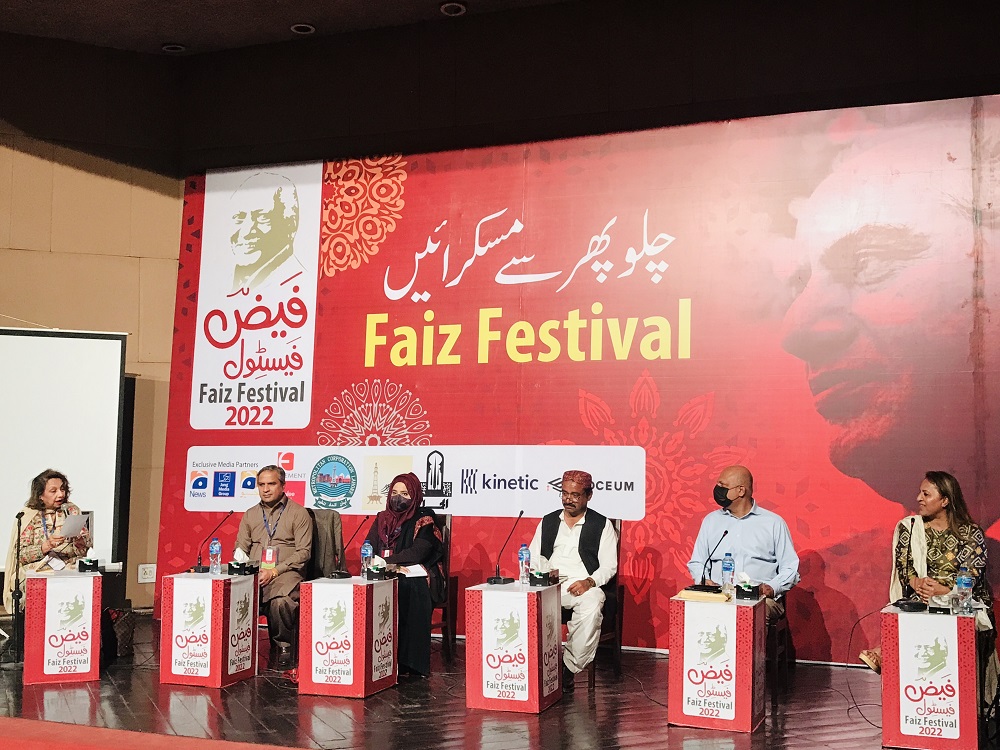Written by: Mahnaz Shujrah
Posted on: March 07, 2022 |  | 中文
| 中文
(L-R) Dr. Arfa Syeda and Zehra Nigah
After being postponed multiple times due to Covid restrictions, the much-awaited Faiz Festival took place this weekend in Lahore, from March 4th to March 6th. The audience was eager to fill the halls of Alhamra in person on the sixth rendition of the event. Usually held in November to commemorate Faiz Ahmad Faiz’s death anniversary, this year the festival took place in March.
Established to celebrate one of the most eminent poets of the 20th century, Faiz Festival is spread over three days and incorporates a variety of themes and had a range of experts, from literature to film, art to human rights and politics to poetry. The event is free and open for all, except for three specified ticketed sessions, which featured Tahira Syed, Zia Moheyuddin and Adeel Hashmi. The schedule of the event was circulated in advance, with multiple parallel sessions taking place throughout the day. In-between the talks, people could partake of a variety of foods and visit book stalls.
Each year Faiz Festival injects Lahore with its infectious energy, the impact of which lasts throughout the year. The unique feature about this event is its intergenerational appeal, all bonded by their love for Faiz and his legacy. However, this year I felt there was a disproportionate representation of youth, which might be due to the fear of Covid amongst the older crowd.
Highlights from some interesting sessions are shared below:
This is one of the sessions I found most interesting, as it was a new addition to the event from previous years, and symbolized that the platform was growing organically to encompass a wider canvas. The panel included a representative from each of the provincial languages of Pakistan, who then shared the historical and current themes of poetry within that language. Nazya Durrani, a young Pashtun poet, shared her insights on the intertwined aspect of war, life, and survival as it made its way in Pashtun poetry on both sides of the border. She beautifully recited her poem “Aman” (peace) in Pashto, along with its Urdu translation. Similarly, Saeed Tabassum Mazari from Balochistan, presented a heartfelt poem in Balochi. He talked about the diversity of Balochistan, which is often overlooked by its own people. He argued that the themes in contemporary Balochi poetry are primarily based on the societal rather than the individual needs and aspirations. Rakhshanda Naveed touched upon the legacy of Punjabi literature, and emphasized the growing number of Punjabi writers both within and across the border. In fact, much of the work in Punjabi literature is being done by the diaspora. It was well articulated during the session that it is great to learn different languages, but it should not be at the cost of your own language.

(L-R) Mehtab Rashdi, Niaz Nadeem, Nazya Durrani, Saeed Tabassum Mazari, Haris Khalique and Rakhshanda Naveed
Since its inception, some panelists have added so much to the Faiz Festival that they have become synonymous with the event itself, and without them the gathering would be incomplete. Zehra Nigah and Dr. Arfa Syeda are undoubtedly two such personalities. The session is my favorite one and I love to hear this dynamic duo. Moderated by Asghar Nadeem Syed, the topic this year was “Adab ka Hosla”. It was discussed how literature and poetry are agents of change and means of bonding within an increasingly divided world. Zehra Nigah shared works of different poets, including Mirza Sauda, whom she had read upon Faiz’s insistence. Arfa Syeda emphasized the role of tajruba (experience), and how it was something which outlived time, space and energy; it is this experience that makes us human and what connects us to each other. How beautifully Arfa Syeda expresses herself and the original insights of Zehra Nigah were a rare treat for the audience.
The panel for this included many of the leading poets in Pakistan, and this year it was extra special as guests from across the border in India had joined the gathering. The largest hall in Alhamra was jampacked as Amjad Islam Amjad, Iftikhar Arif, Kishwar Naheed, Anwar Shaoor, Dr. Khursid Rizvi, Yasmeen Hameed, Arvinder Chamak and Sarbjot Bhel graced the stage with their presence. The nostalgia of pre-Partition and the unfulfillment that followed the divide, was a theme that haunted the evening, while the appreciation of the audience grew as the night advanced. In that brief moment, the worries of life seemed distant, and the heartbeat of Lahore seemed to match ones own.
The festival came to an end, as all good things must, but it is a hopeful goodbye as we look forward to more occasions like this. The Faiz Festival is growing, and in coming years changes will have to be made to accommodate larger audiences.
You may also like: